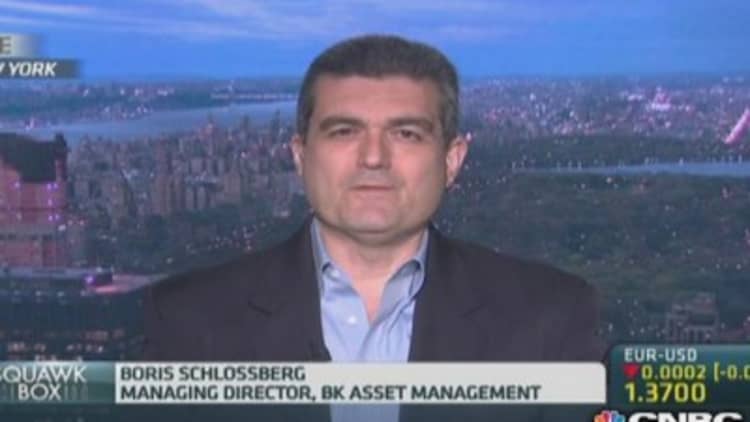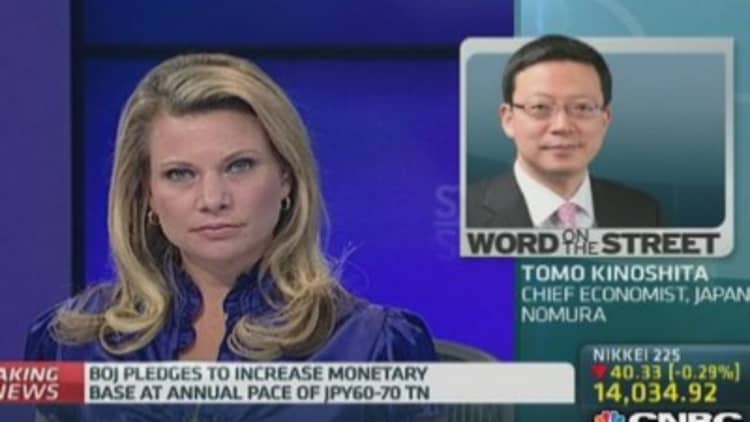
Despite all the finger-pointing at Japan's consumption tax hike and the failure to push through promised structural reforms, some analysts believe the real culprit behind the 's weakness may be the U.S. dollar.
"Everybody thought the easiest trade in the world in 2014 was going to be long dollar-yen, probably 105 -110," Boris Schlossberg, managing director of foreign-exchange strategy at BK Asset Management, told CNBC. "We're still struggling at 101 precisely because U.S. yields are so low."
The dollar is fetching 101.42 yen, down from the 105.44 high touched late last year.
With a strong correlation between the yen's movements and the Nikkei, "the lower the dollar-yen goes, the lower the Nikkei is going to go as well," Schlossberg said.
The Nikkei, which soared almost 57 percent last year amid aggressive monetary stimulus from the Bank of Japan and a weak yen, has tumbled 14 percent so far this year, making it one of the worst-performing major markets.
Schlossberg has been closely watching U.S. Treasury yields, which have been hovering just over 2.5 percent.
"If U.S. rates go below 2.5 percent on the 10-year (Treasury), there's a very strong possibility the dollar-yen will go below 100," he said.
Read More Why tapering didn't push up bond yields
There may not be any relief on the U.S. interest rate front any time soon. While many analysts expected Treasury yields to rise as the U.S. Federal Reserve tapered its asset purchases, they've actually slipped since tapering began in January and some expect the trend may not change.
"The bottom line is people still want yield," Sheila Patel, head of international at Goldman Sachs Asset Management, told CNBC. "You still have huge amounts of pension money around the world and retirement savings (and) people in the aging curve of the demographic. They need fixed income and the bellwether of fixed income is still U.S. Treasurys," she said.
Read More More BOJ stimulus soon? Don't bet on it
So far this year, dedicated long-term U.S. government bond mutual funds and exchange-traded funds (ETFs) have seen $4.65 billion worth of inflows, according to Jefferies data. Overall, U.S. bond funds have seen $49.32 billion worth of inflows this year, the data show.
All of these flows are working to keep U.S. yields low and weighing on the dollar and by extension may be frustrating Abenomics, or the more than one-year-old plan from Prime Minister Shinzo Abe to kick-start Japan's long-moribund economy. One of Abenomics' aims was to weaken the yen to combat deflation, partly via a massive easing program from the Bank of Japan.

Read MoreJapan's economy grows at fastest pace in nearly 3 years
"With yen continuing to sort of increase in value, the whole policy of reflating the economy and therefore trying to stimulate economic growth isn't working as well as they hoped," Schlossberg said, although he noted the policies clearly aren't completely failing.
In the first quarter, Japan's economy clocked stronger-than-expected growth of 5.9 percent from a year earlier, although many analysts expect a pullback this quarter after consumers moved purchases forward to beat the tax hike at the beginning of April.
Schlossberg believes the BOJ may need to sharply increase its easing measures to get the yen back on a downward trajectory.
Read More Are Japan stocks set to slide further?
"It's going to be a very, very challenging quarter for the Japanese policy makers if they simply stay stationary," Schlossberg said.
The BOJ clearly doesn't agree, deciding Wednesday to keep monetary policy steady and some don't expect fresh measures anytime soon.
"The optimistic tone of recent BOJ communication suggests that the chances of additional stimulus being announced as soon as July have shrunk substantially," Capital Economics said in a note after the central bank's decision was announced. It expects the market may need to wait until the BOJ's October meeting for more stimulus measures.
—By CNBC.Com's Leslie Shaffer; Follow her on Twitter @LeslieShaffer1


